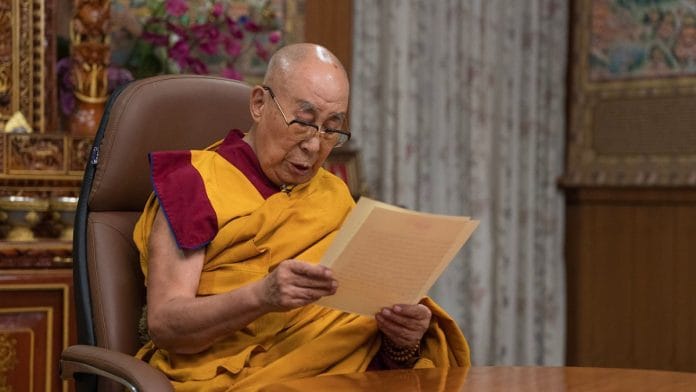New Delhi: Effectively shutting out China’s claim of having a say in the choice of the Dalai Lama’s next reincarnation, the Tibetan spiritual leader Wednesday said that only the Gaden Phodrang Trust, which he founded, has the authority to choose his successor.
“I hereby reiterate that the Gaden Phodrang Trust has sole authority to recognise the future reincarnation; no one else has any such authority to interfere in this matter,” the Dalai Lama said in a statement from Dharamshala, ahead of his 90th birthday this week.
That process, he added, would be conducted according to centuries-old religious traditions, in consultation with senior Tibetan Buddhist leaders and spiritual protectors, further challenging Chinese claims that reincarnation of lamas—especially the Dalai Lama—is a matter of state policy.
However, hours later, the Chinese foreign ministry asserted that the future reincarnation needs to be approved by the Chinese government, adding that the succession must comply with Chinese laws and regulations as well as “religious rituals and historical conventions”.
In making the claim that it has a say in the matter of succession, China cites a tradition dating back to the Qing dynasty in 1793, when a golden urn ritual was introduced to select high-ranking lamas.
Wednesday’s announcement by the Dalai Lama countered these persistent claims, reinforcing a position that he has held for decades. In 1969, he had said that the continuation of his institution should be left to Tibetan people. In 2011, after stepping down from his political role in the Tibetan government-in-exile, he had formalised this stance, saying that the responsibility for recognising his successor would rest entirely with the religious leadership of the Tibetan community.
The parliament-in-exile, based in Dharamshala like the Dalai Lama, says mechanisms are in place to ensure the continuity of the exiled government, while the Gaden Phodrang Foundation will be responsible for locating and recognising his successor. Established by the Dalai Lama in 2015, the foundation’s mission is to preserve the spiritual and religious legacy of the institution, and its leadership includes several of his close aides.
On Wednesday, he said that over the past 14 years, he received multiple appeals from Tibetans inside Tibet, members of the diaspora, and Buddhist communities across Asia, including from mainland China, Mongolia and Russia, urging him to preserve the institution of the Dalai Lama.
In response, he formally confirmed that his spiritual lineage will continue, but emphasised that the process will be guided solely by religious tradition and the Tibetan Buddhist community, without interference from any political authority.
Also Read: Quad launches new agenda, raises concern on China’s control over critical minerals supply chains
The China concern
The question of the Dalai Lama’s reincarnation is part of a broader and deeply contentious struggle over Tibet’s political and religious future.
After a failed uprising against Chinese rule in 1959, the Dalai Lama fled Tibet and established a government-in-exile in Dharamshala, which Beijing has never recognised. While he has long abandoned calls for Tibetan independence, instead advocating for a “Middle Way” approach seeking genuine autonomy within China, the Chinese government continues to view him as a separatist entity.
Tensions escalated in March this year when the Dalai Lama, in his book Voice for the Voiceless, suggested that his next incarnation would likely be born outside of China. In the book, he urged Tibetans to reject any successor “chosen for political ends”, including by the Chinese government.
In response, a Chinese foreign ministry spokesperson then called him a political exile with “no right to represent the Tibetan people”, insisting that Chinese rule has brought development and ended serfdom in Tibet.
The last formal talks between the Dalai Lama’s representatives and Chinese officials were held in 2010, and Beijing has since demanded that he “thoroughly correct” his political views before any contact can resume.
Last year, a bipartisan delegation of US lawmakers had met with the Dalai Lama in India and pledged support for Tibetan religious freedom, asserting that China must not interfere in the spiritual traditions of Tibetan Buddhism.
On 12 June, 2024, the US Congress passed the Resolve Tibet Act, which counters Chinese disinformation about Tibet, and calls for direct dialogue with the Dalai Lama and Tibetan leaders to peacefully resolve the dispute. It affirms Tibetans’ right to self-determination and recognises their distinct cultural, religious and historical identity.
Beijing, on its part, dismissed the Resolve Tibet Act, reiterating that Tibet is an integral part of China and warning against any foreign interference.
(Edited by Mannat Chugh)
Also Read: The US-China dispute over fentanyl drug & why Japan is caught in the crossfire






